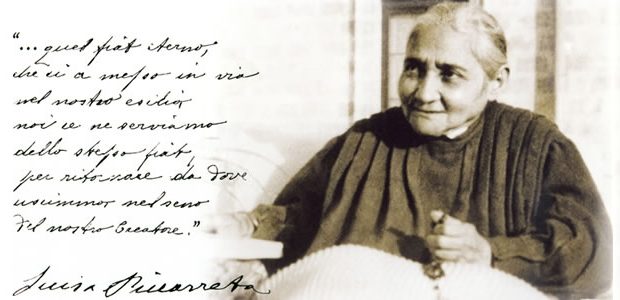Pope Francis pronounce the official Formula of Canonization, raising Mother Teresa of Calcutta to the honours of the altar:
Ad honorem Sanctae et Individuae Trinitatis,
ad exaltationem Fidei Catholicae
et vitae christianae incrementum
auctoritate Domini nostri Iesu Christi,
beatorum Apostolorum Petri et Pauli ac Nostra,
matura deliberatione praehabita
et divina ope saepius implorata,
ac de plurimorum Fratrum Nostrorum consilio,
Beatam Teresiam de Calcutta
Sanctam esse decernimus et definimus,
ac Sanctorum Catalogo adscribimus,
statuentes eam in universa Ecclesia
inter Sanctos pia devotione recoli debere.
In nomine Patris et Filii et Spiritus Sancti.
Amen.
English translation:
To the honour of the holy and undivided Trinity,
for the exaltation of the Catholic faith
and the increase of the Christian life,
by the authority of Our Lord Jesus Christ,
of the Holy Apostles Peter and Paul, and of Ourselves,
after mature deliberation
and frequent prayer for the Divine assistance,
with the advice of Our venerable brethren,
We decree and define
Blessed Teresa of Calcutta to be a saint,
and We place her name in the catalogue of Saints,
decreeing that in the universal Church
she is to be venerated among the Saints with pious devotion.
In the Name of the Father, and of the Son, and of the Holy Spirit.
Amen.
(Vatican Radio) Cardinal Pietro Parolin, Vatican Secretary of State, celebrated the Mass of Thanksgiving on Monday for the canonization of Mother Teresa of Calcutta.
In his homily for the Mass in St. Peter’s Square, Cardinal Parolin recalled several key moments of her life and the thirst for God which drove her every action:
‘Caritas Christi urget nos: the love of Christ compels us’ was the recurring theme of Cardinal Pietro Parolin’s homily for the Thanksgiving Mass.
These words, he said, summed up the flame of love which compelled the now-St. Teresa of Calcutta during her life and which compel us to follow her example.
Cardinal Parolin revisited several of the key events of Mother Teresa’s life, including her self-definition as ‘a little pencil in God’s hands’.
‘Mother Teresa,’ he said, ‘was a clear mirror of the love of God and an admirable example of service to our neighbor, especially to the poorest, most derelict, and most abandoned of people.’
He also recalled her constant fight for the rights of the unborn, which he said grew out of her recognition that the worst form of poverty is ‘to feel unloved, unwanted, scorned’.
He said, ‘This recognition brought her to identify unborn children whose very existence is threatened as the “poorest of the poor”. Each of them depends, more than any other human being, on the love and care of the mother and on the protection of society.’
Cardinal Parolin went on the recall Mother Teresa’s acceptance speech for the Nobel Prize in 1979, in which she said, ‘It is very important to realize that love, to be true, has to hurt. It hurt Jesus to love us, it hurt him.’
He said these words ‘are like a doorway through which we enter into the abyss, which surrounded the life of the Saint.’
Cardinal Parolin concluded his homily remembering the two simple words she had posted in every house of the Missionaries of Charity: ‘I thirst’.
‘I thirst,’ he said, ‘a thirst for fresh, clean water, a thirst for souls to console and to redeem from their ugliness to make them beautiful and pleasing in the eyes of God, a thirst for God, for His vital and luminous presence. I thirst; this is the thirst which burned in Mother Teresa: her cross and exaltation, her torment and her glory.’
‘St. Teresa of Calcutta, pray for us!’

